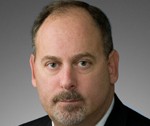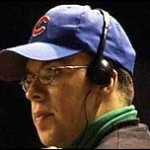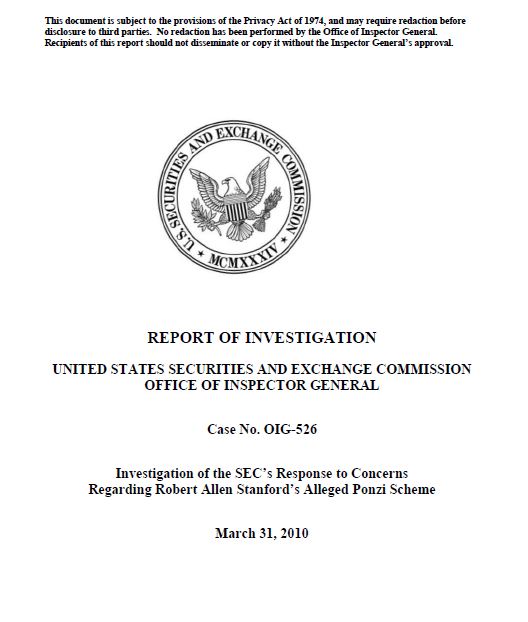UPDATE: In January 2012, federal prosecutors announced that Spencer Barasch, formerly chief enforcement officer in the Fort Worth, Texas office of the Securities and Exchange Commission, had agreed to pay $50,000 to settle charges that he violated federal conflict-of-interest standards by providing representation for financier R. Allen Stanford, the Associated Press reported.
Barasch is now a partner with the Dallas law firm, Andres Kurth LLP.
Malcolm Bales, the U.S. Attorney for the Eastern District of Texas, said the fine, the maximum amount allowed under law, shows that the government is serious about cracking down on former federal officials who attempt to us their influence in the private sector, the AP reported.
Bales said, “There should be zero tolerance for people who serve the public and then go into the private sector and use [that service] for personal benefit,” he said, according to the AP. Barasch’s lawyer, Paul Coggins, a former federal prosecutor, said his client settled witht he government “to avoid the expense and uncertainty of protracted litigation.”
# # #
Now here’s the original Watchdog Nation report:
I nominate Spencer C. Barasch for an asterisk when the whole story of the Great Recession is told by historians in years to come.
He is the Steven Bartman of the financial regulatory world.
In a baseball playoff game at Wrigley Field in 2003, Bartman touched a foul ball and disrupted a potential catch by the Cubs’ outfielder. The Cubs lost the lead — and the game. They never made it to the World Series. So Bartman is the Mr. Asterisk of Cubs’ baseball.
The same can be said for Spencer Barasch, too. I’m sure you don’t know who he is. But it’s important that you know these Dirty Dozen Facts about Mr. Asterisk:
1. Barasch was the former head of the Securities and Exchange Commission’s enforcement office in my hometown of Fort Worth, Texas.
2. In 1997, auditors in that office thought that accused swindler R. Allen Stanford may have been conducting a Ponzi scheme.
3. SEC enforcement, led by Mr. Asterisk, closed that inquiry because, he said, the plan lacked U.S. investors. That decision was described by some insiders as unprecedented. But Mr. Asterisk later explained, according to the SEC Inspector General, that he called Stanford’s attorney to sound out the case against him, and Stanford’s attorney explained why there was no case.
4. In 2002, SEC examiners again referred Stanford to enforcement. Again, Mr. Asterisk’s department took no action.
5. In 2003, the SEC received more complaints about Stanford’s investment scheme but did not act.
6. In 2004, SEC examiners prepared another case against Stanford.
7. In 2005, Mr. Asterisk decided once again that examiners will take no action.
8. That same year, Mr. Asterisk leaves the government for the Dallas law firm, Andrews Kurth, where he works today as a defense attorney. SEC staffers finally refer the case to enforcement, where the next year, the SEC opens an official investigation.
9. After leaving the government, Mr. Asterisk asked the SEC’s ethics branch for permission to represent Stanford. In his e-mail seeking permission, Mr. Asterisk wrote: “Every lawyer in Texas and beyond is going to get rich over this case. Okay? And I hated being on the sidelines.” His request was denied.
10. Even though he was denied, Mr. Asterisk did a small amount of work for Stanford in October, 2006, in apparent violation of SEC rules. The SEC has referred this to the State Bar of Texas.
11. In 2009, the SEC sued Stanford and criminal charges, still pending, were also filed. Victims claim losses around $7 billion. Stanford, who remains in jail, maintains his innocence.
12. On March 31, 2010, the SEC Inspector General released a report that targets Mr. Asterisk for the blame in lack of earlier prosecution. Read the full Inspector General report here.
Do you see why this lawyer should be included in any telling of the Great Recession?
A regulator who thwarts justice because he has other goals in mind — including earning tons of money — is a dream come true for Wall Street and a nightmare for the rest of us.
# # #
Dave Lieber, The Watchdog columnist for The Fort Worth Star-Telegram, is the founder of Watchdog Nation. The new 2010 edition of his book, Dave Lieber’s Watchdog Nation: Bite Back When Businesses and Scammers Do You Wrong, is out. Revised and expanded, the book won two national book awards in 2009 for social change. Twitter @DaveLieber





